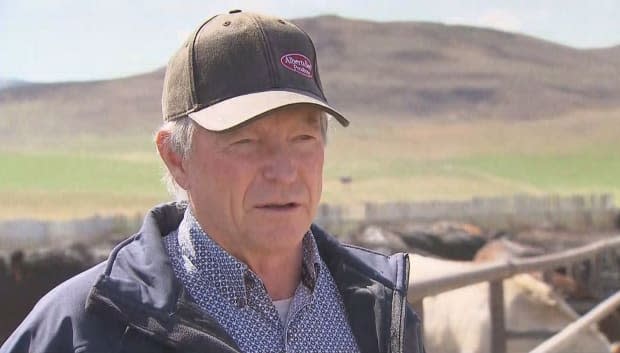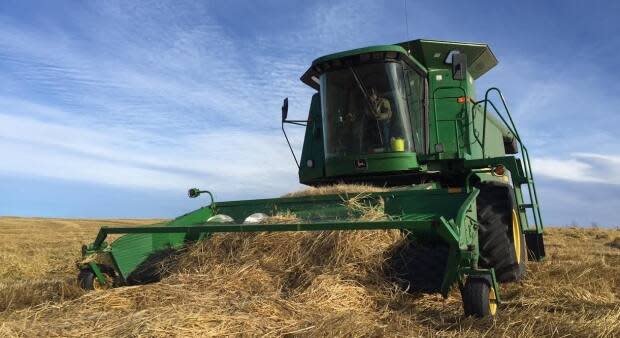Alberta ranchers face difficult decisions as drought drags on

Alberta ranchers hit hard during the pandemic last year are now dealing with drought conditions that are devastating vital grazing land and taking both a financial and emotional toll.
"This should have been a year to put some profit back in the industry — then we get this drought," said Alberta rancher and feedlot operator Bob Lowe, president of the Canadian Cattlemen's Association.
"You can imagine what that's doing to the mindset of a lot of people."
It's been a difficult summer for many farmers across the Prairies as they deal with the effects of long bouts of hot temperatures and a dearth of moisture.
In the cattle sector, it's led some livestock producers to face the difficult decision to start selling off their herds into a depressed market.
Craig Klemmer, principal agricultural economist at Farm Credit Canada, said the impact can be seen at auctions across the Prairie provinces, with an influx of animals coming to market sooner and at lighter weights.

Klemmer said the realization that people may have to start selling off some of their cattle is putting downward pressure on the price of breeding stock.
Klemmer said he's seen cow-calf pairs auctioning for 20 to 25 per cent less than they were a year ago, due in part to the shortage of feed in southern Alberta.
"That's a fairly large decline," Klemmer said.
The situation comes on the heels of the financial hit that ranching took last year when COVID-19 outbreaks at meat-processing plants led to costly cattle backlogs.
It had been hoped this year might provide a rebound, but few regions have been so fortunate.
"Emotionally, this is really affecting a lot of people," Lowe said.
This week, Rocky View County, which surrounds much of Calgary, declared an "agricultural disaster," highlighting "one of the worst growing seasons in recent memory."
In recent days, Vulcan County, Foothills County, Greenview, the County of St. Paul and Lac Ste. Anne County, among others, have also declared agricultural disasters.
Even if rain comes now, the concern is it may be too late to help much this year, if at all.
Alberta's most recent crop report, issued at the end of July, said over 50 per cent of the pasture acres in the province were rated as poor.
Brad Dubeau, general manager of the Alberta Beef Producers, said ranchers probably face one of the most difficult decisions they've had to make in several years.

"They are faced with the decision of: can they acquire enough feed for the winter months ahead," Dubeau said.
"Depending on how much feed they can source, they will have to make the difficult decision on whether or not they can keep the whole mother-cow herd on their … farm and ranch."
But the drought is making it harder to find feed and hay for cattle, with increased demand pushing up the price. Now, Dubeau said he understands that American ranchers are also reaching into Canada to purchase feed.
"Which continues to drive the cost of feed up in Alberta," he said.
Dubeau said producers are looking for government support. Last weekend, the group met with Premier Jason Kenney and Agriculture Minister Devin Dreeshen to discuss the situation.
"We look forward to continue negotiations on what potential support there may be out there or what potential support that might be available for our producers in Alberta," he said.
In an interview Wednesday, Dreeshen said the province is taking steps to help producers, including adding insurance adjusters so farmers can more quickly convert marginal crops into feed for livestock.
The province is also working through the details with the federal government for an AgriRecovery program, he said.
"We got the ball rolling early on and we're hopeful that we'll be able to do an announcement before possibly a federal election," said Dreeshen.
Ranchers who might decide to sell their cattle today may face a financial "double-whammy," Lowe said.
If forced to do so now, he explained, they face selling into a depressed market. But when the market eventually improves and they have to buy replacements, they could well be buying in an inflated market.
As the drought drags on, he tries to remain hopeful.
"Every day it doesn't rain is one day closer to the day it will," Lowe said.
"That's what keeps me going."

